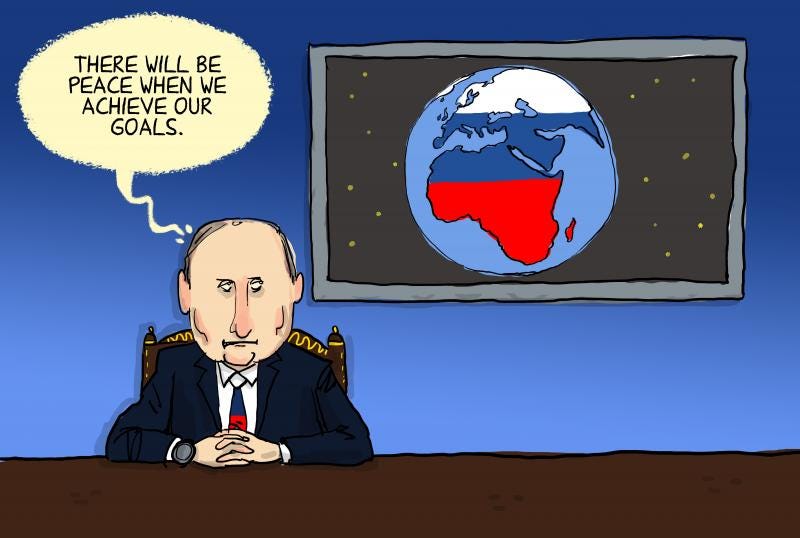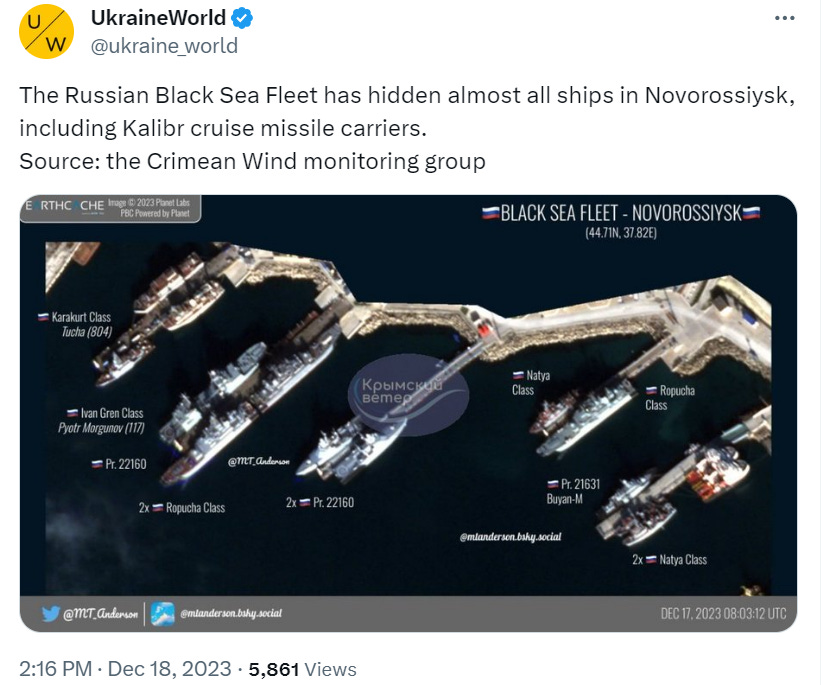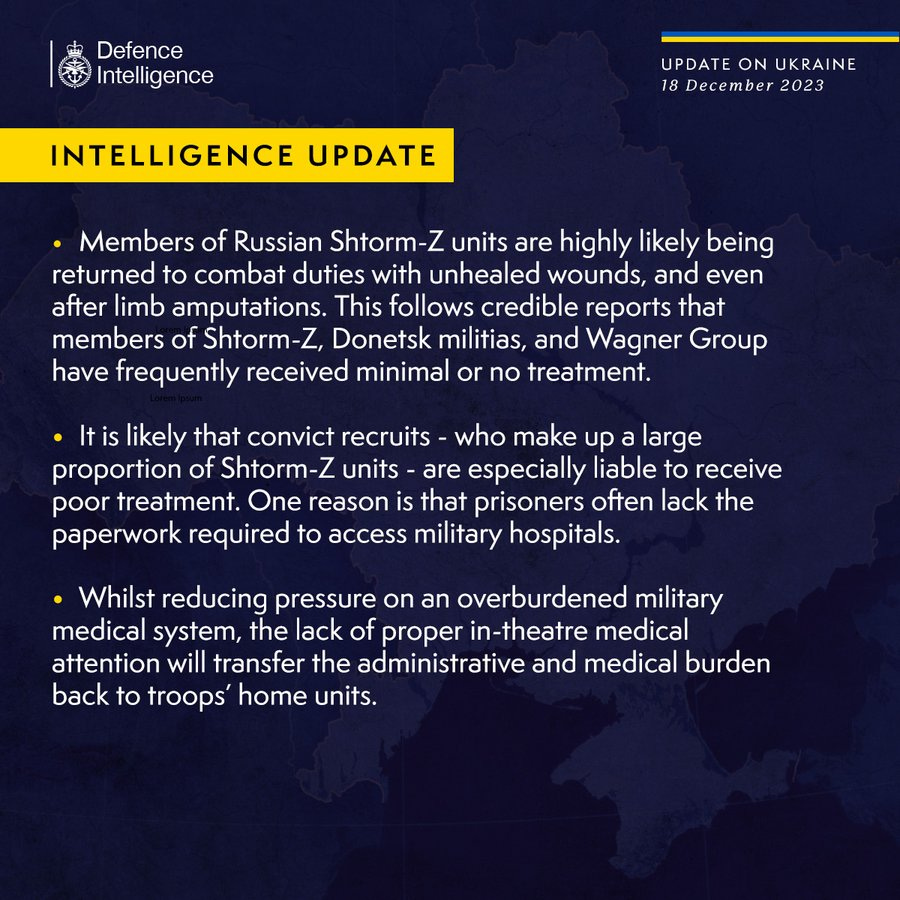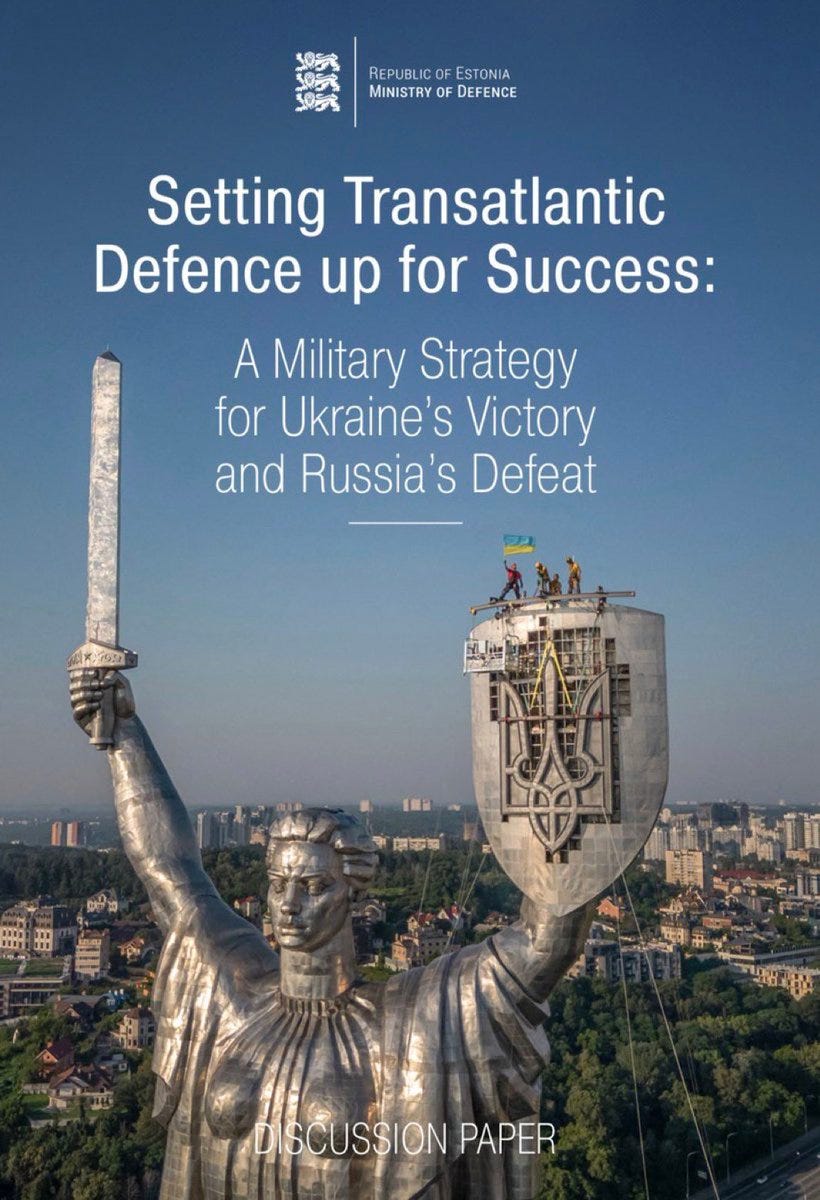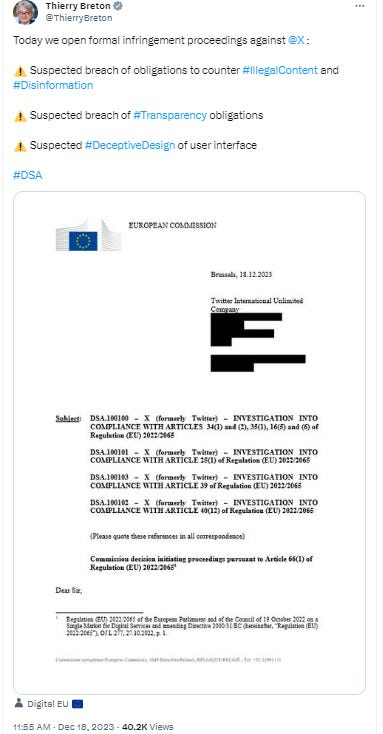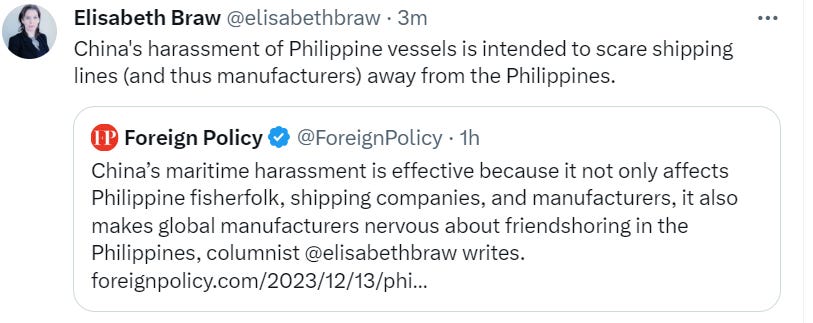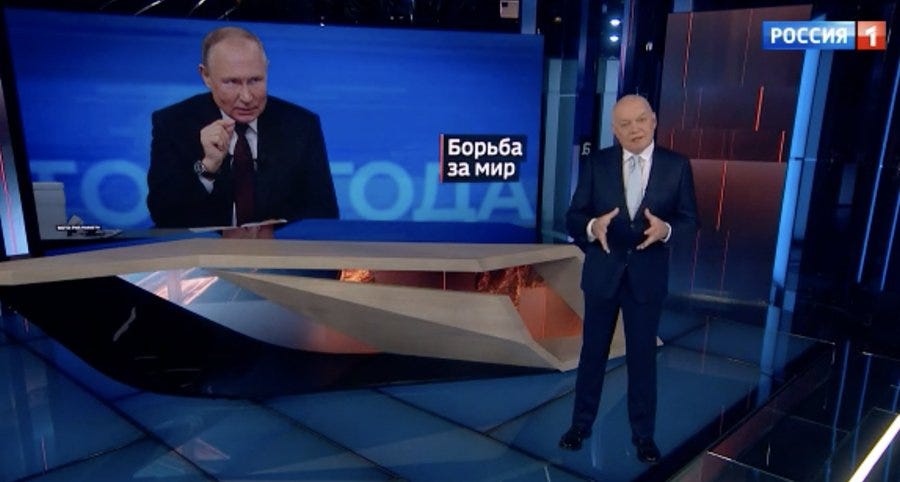Dec 19: E-Stories
Day664 Kherson Avdiivka CombatSit BehindLines Danube InRussia Allies A&P Halushka IWS UKDef Kormarnyckyi Everest Zaluzhnyi IndoPac Wieslander Seddon Davis Panyi Christie EEIntel BrettonX Braw Junisbai
Catching up…
EA Worldview’s Ukraine Up-date- hop over to Scott’s amazing hourly Ukraine up-date page. I’ll fill in with some bits and bobs.
Stories we’re following…
The Kherson region has been hit by 374 shells over the last day, killing one person and damaging infrastructure and residential buildings, reports Gyunduz Mamedov, a former deputy prosecutor general of Ukraine. At least 8-9 regions of Ukraine are shelled every day.
Russia has damaged or destroyed almost every building in the eastern Ukrainian city of Avdiivka, according to a new report, as part of a major assault which has seen civilian infrastructure deliberately flattened.
According to the Centre for Information Resilience, all 17 of the city’s educational institutions have been hit. The Russians have targeted nine out of eleven medical clinics, all five of Avdiivka’s churches and its three large supermarkets. The worst affected district is Khimik, made up of Soviet-era housing.
The Russian occupying forces have once again rejected a request from the IAEA mission at Zaporizhzhia Nuclear Power Plant (ZNPP) for access to a nearby thermal power plant to assess the external backup power supply, reports the International Atomic Energy Agency (IAEA).
It will be impossible to rebuild the Avdiivka Coke Plant after the end of the war due to the destruction caused by Russian shelling, stated Yurii Ryzhenkov, CEO of Metinvest group of companies, in an interview with Forbes. Metinvest is an international group of steel and mining companies that owns operations in Ukraine, Italy, Bulgaria, the UK and the US.
Everest Today: Spectacular sight! Ukrainian climber Antonia Samoilova proudly waves the Ukrainian flag atop Mt Everest (8848.86 m), 24.05.2023; reaching the top of the world for the second time. Video ©: Sandro Gromen-Hayes via Antonia Samoilova/IG.
Combat Situation Update
“Russia is stockpiling missiles of various types for new attacks on Ukraine. In particular they are accumulating Iskander-M missiles while they also have enough kamikaze drones to attack us daily," Air Force spokesman Ignat said on live television.
Shout out to the legacy press and viewers from General Zaluzhnyi: "I can't say what I'm planning, because otherwise it will be a show, not a war," replied Commander-in-Chief #ЗСУ General Valery #Залужний in response to journalists' questions about whether there will be a counteroffensive and what actions are planned.
InformNapalm investigators add:
“Real soldiers are people of action, not words, who do their hard and dangerous work and don't like to make populist statements about 2-3 weeks or barbecues in Crimea in the summer. Soldiers don't wear rose-colored glasses to be liked and to "radiate positivity." The military wear tactical glasses and think strategically. The military does not think about ratings among Ukrainian society, because they are the most active part of this society, who took up arms to defend the country and for this they have the respect and support of the majority of citizens. The military, and with them the entire Ukrainian society, will win this war.”
Russia loads new intercontinental ballistic missile into silo in Kaluga Oblast. The RS-24 Yars missile system carries multiple independently targetable re-entry vehicles (MIRV), enabling it to deliver several nuclear warheads to different targets.
Frontline Ukrainian soldiers face shortages of artillery shells and have scaled back some military operations because of a lack of foreign assistance, Brig Gen Oleksandr Tarnavskyi, a senior army general said. He told Reuters: “There’s a problem with ammunition, especially post-Soviet (shells) – that’s 122 mm, 152 mm. And today these problems exist across the entire frontline. The volumes that we have today are not sufficient for us today, given our needs. So, we’re redistributing it. We’re replanning tasks that we had set for ourselves and making them smaller because we need to provide for them.”
Stephen Kormarnyckyi: “Powerful video from Magyar and addressed to the NYT. I agree with every word. Ukraine is suffering from careerist western and indeed Ukrainian journalists. During an existentialist war for survival such anecdotal reportage is dangerous and Supports current Russian psyop.”
Stephen’s point is relevant. Many examples from the legacy media in print, on TV, and the radio are using the war to advance their financial models through irresponsible distortions. Our team has noticed that the NYT is doing so. The NYT story that commander Magyar is referring to in the video can be read here.
For two months, Ukraine’s Marine Corps has been spearheading an assault across the Dnipro River in the southern region of Kherson to recapture territory from Russian troops. The operation is Ukraine’s latest attempt in its flagging counteroffensive to breach Russian defenses in the south and turn the tide of the war.
Soldiers and marines who have taken part in the river crossings described the offensive as brutalizing and futile, as waves of Ukrainian troops have been struck down on the river banks or in the water, even before they reach the other side.
Behind the Lines
Russia seizes properties belonging to 77 individuals, companies in occupied Crimea. In total, Russian-installed official Vladimir Konstantinov said that 1,150 properties had been seized.
Council member who detonated grenades in government building is charged with terrorism, detained without bail. A local council member, alleged to be Serhii Batryn, was charged with terrorism and was ruled to be kept in pre-trial detention without bail. On Dec. 15, he allegedly detonated three grenades inside a crowded room in a local government building in the western Zakarpattia Oblast, killing one and injuring 22.
UA-TV: Russia expelled from the Danube Commission. Setting aside all technical and moral considerations, Russia usually participates in international organisations to gather intelligence and recruit agents of influence as well.
National Resistance Center: Russia increases special forces in occupied Kherson Oblast. The Center said that Russian occupation forces were increasing "counter-sabotage" efforts throughout the region to intimidate residents who passed information on to the Ukrainian military.
The FSB reported on the detention of a Crimean resident suspected of transferring information to Ukraine about the Russian military
In the Pskov region, FSB officers detained a resident of Crimea. According to the intelligence service, for six months (from August to December 2022) he took photographs and videos of military equipment and positions of the Russian army, after which he transferred this information to Ukraine.
Polish farmers to join blockade on Ukrainian border. Polish farmers association United Village will join the blockade of the Polish-Ukrainian border at the Yahodyn-Dorohusk crossing at 2:30 p.m. local time on Dec. 18, protest organizer Rafal Mekler said late in the evening on Dec. 17.
North Korea launches second missile, firing long-range weapon into sea. North Korea fired an intercontinental ballistic missile (ICBM) into the Sea of Japan on Dec. 18, less than 24 hours after launching a short-range missile, South Korea's Yonhap News Agency reported.
Last week, the Baltic Defence Council met to discuss security in the region with U.S., France, and a handful of other countries, and extending an invitation for Germany to join the group. The conclusions and recommendations emerging from the conference include an increase in military capabilities in the region, and a revisitation of regional policies regarding recruitment, and the realisation that deterrence is the main strategy to fend off a future Russian attack in the region.
Victor Kvert: A GRU key, senior instructor of the Wagner gang, and a colonel and head of the 4th department of the special operations directorate of the General Prosecutor's Office, who played an important role in the GRU covert operations in Donbas in 2014, has flown to Amsterdam and requested political asylum in the Netherlands.
He is ready to appear before the ICC in The Hague and testify against V. Surkov, A. Boroday, the commander of the 10th Special Forces Brigade of the General Directorate of the General Staff of the Russian Federation (v/h 51532), Major-General S. Svid (call sign "Ryazan", supervisor of Redut and Wagner), as well as other high-ranking orcs from the Federal Security Service and the Ministry of Defence of the Russian Federation, who supervised special operations on the territory of Ukraine in 2014-2015 and in 2022.
Meanwhile in Russia
Russia’s prime minister, Mikhail Mishustin, will meet China’s president, Xi Jinping, this week, the Russian government has said, according to Sky News. The two leaders are expected to meet for talks in China on 19 and 20 December, with Mishustin also due to hold a meeting with the Chinese premier, Li Qiang.
Who would want to invade Russia? You can’t even get eggs there: Russia is now looking to Iran to import eggs. (see next post entry) Kidding aside: he’s twisted (in more ways than one) Ukraine’s counteroffensive to bring occupied territory back under Ukraine’s rightful sovereignty. He’s got to invent something for his campaign…scaring people usually works. Look at Trump. All he would really need to do is promise eggs…maybe a few other basics.
Putin’s address at the conference lasted 4 1/2 hours. Yes, people had to sit through his rambling on and on.
Anyone want some eggs…in Russia. Eggs have increased by 42.5% in a year. [Video: Mirovich]
Border regions? They do this everywhere all the time. It’s improvised polling stations because everyone knows the results anyway. What difference does it make where people vote? It’s just a show.
Russian prisoners who have returned from the front have already committed at least 27 murders, Welt quoted an investigation by the group "Agency" as saying Despite a general silence on the issue of the brutality of returning veterans on the part of state propaganda, local Russian media have repeatedly reported on outbreaks of violence by former military personnel, often resulting in fatalities.
EU officials have considered reactivating the Article 7 punishment procedure for rule of law breaches, which can result in the suspension of Hungary’s voting rights. It can be blocked by another member state, but Poland is not seen as a protector anymore .
Latvia may deport more than 1,000 Russians for failing to meet residence requirements. The Latvian parliament passed an amendment in 2022 tightening residency rules for Russian citizens in response to Russia's invasion of Ukraine. Russians living in Latvia are now required to apply for permanent residence and pass a basic-level Latvian language test.
Allied Support
IMF chief: Ukraine's economy depends on continued aid. Ukraine's economy could likely withstand a funding delay of "a couple of months," but a longer gap would put the nation's path to economic recovery at serious risk, IMF Director Kristalina Georgieva said.
"Delays in providing additional funding will jeopardize the recovery of Kyiv's economy. Ukraine will manage until early next year, but will have to cut spendings or resort to central bank financing to cover expenses," IMF Managing Director Georgieva said.
The EU has adopted a 12th package of sanctions against Russia, the European Commission has said.
This package focuses on imposing additional import and export bans on Russia, combating sanctions circumvention and closing loopholes, the council said.
Among the measures is the prohibition on the direct or indirect import, purchase or transfer of diamonds, including jewellery, from Russia.
The EU is to make over €65m available to Ukraine’s neighbours to help fund hosting of refugees. The European Commission said the money from the Asylum Migration and Integration Fund will support Bulgaria, Czechia, Poland, and Romania. The European Union is hosting more than 4.1 million people benefiting from temporary protection, a status that holds until 2025.
The EU will hold a summit on 1 February to discuss its multi-annual budget, including funding for Ukraine, the European Council president, Charles Michel, has said. EU leaders agreed last week to open membership talks with Ukraine, but they could not agree on a €50bn (£43bn) package of financial aid for Kyiv due to opposition from Hungary.
U.S. to announce new aid package for Ukraine in late December, it will be the last allocation - White House "We are planning another aid package for Ukraine later this month," a White House official told reporters at a briefing. The Biden adviser also added that without a decision by the US Congress on the allocation of funding, Washington would no longer have available resources to support Ukraine.
Australia also increases its commitment to training Ukrainian Armed Forces recruits as part of Operation 'Kudu' in 2024 The Australian Army has helped train over 1,200 recruits as part of the 'INTERFLEX' training mission.
The Ministry of Defence of Estonia offers a clear path to Ukrainian victory. “This war can be won within the next three years or less.” How?
Adjust and increase our military production output and assistance to Ukraine.
Impose the perspective of an intolerable level of attrition on Russia.
The global security environment is spiralling downwards at a rapid pace. Freedom and democracies are increasingly threatened across continents. The Euro-Atlantic community faces a multitude of crises, which are increasingly declining into security challenges, that neither the United States nor Europe could tackle alone.
The credibility, capability and readiness of our deterrence posture and forward defences bear an essential role that will likely be tested at an unprecedented scale by adversarial powers and non-state actors for years to come – also after the war in Ukraine.
Our efforts and resources must be mobilised to this end immediately, because each delay will be converted into a high price to be paid, when history stops being on our side. Every characteristic of this moment is being shaped on the vast battlefields in Ukraine.
Russia remains the most significant and direct threat for Euro-Atlantic security. Russia has a long-term objective of fundamentally reshaping the security landscape to its liking. Russia continues to demonstrate its intent and readiness to fulfil this objective in words and deeds alike. [continue]
The main units of a German army brigade that is moving to Lithuania will start to arrive in 2025 and reach full fighting readiness in 2027, Lithuanian’s defence minister, Arvydas Anusauskas, has said. Germany’s defence minister, Boris Pistorius, called the agreement on a permanent deployment of a German brigade in Lithuania a “historic moment,” adding it is the first time that Germany permanently stations troops outside its borders.
BP has halted all shipments of oil and gas through the Red Sea after a step-up in attacks on cargo ships by Houthi militants. The British oil company said on Tuesday that it had paused shipping in the region indefinitely, citing a “deteriorating security situation” amid tensions in the Middle East. BP becomes the first oil company to directly halt its own shipping, after five big shipping companies stopped their vessels passing through the waters between Asia and Africa which connect Asia and Europe, with the Suez canal at the tip.
Vucic's party claims victory in Serbian parliamentary elections. Serbian President Aleksandar Vucic and his ruling Serbian Progressive Party SNS claimed victory in parliamentary elections on Dec. 17 after exit polls indicated SNS had won just short of 50% of the vote. The country's pro-European opposition, organized in 2023 under the Serbia Against Violence alliance, came in second place with around 23%, according to early results released later by election observation NGO CESID.
Azamat Junisbai: Memories of the Dec 1986 Almaty Protest
Thirty seven years ago, in December of 1986, Kremlin appointed G. Kolbin as the new head of the “Kazakh SSR.” The appointment of a complete outsider with no prior connection to Qazaqstan perfectly exemplified the brash arrogance of Russia’s colonial rule in Central Asia.
People took to the streets of Almaty to protest this decision. The scale of the protest was unprecedented in Soviet history. Moscow sent in troops from outside the Republic to crush the protesters. This 2016 article by @LadyPutz offers a useful summary.
I was only 10 years old then. My memory of the time is fragmented. I remember my uncle, 37 at the time, saying that he barely escaped with his life from the charging soldiers at the “New Square.” My uncle was the strongest and most physical person I knew. His words puzzled me.
I also remember that, in the aftermath, the words “nationalists” and “drug addicts” were used to condemn the protesters on the news and in my school. It seemed odd because my uncle was a Russian-speaking fitness fanatic who started every day with an hour-long run.
Now that I am 10 years older than my uncle was in 1986, I often think about the poison of 🇷🇺propaganda portraying those who dared to protest against the colonial dictate as delinquents and criminals. Today, Russia calls Ukrainians defending their freedom Nazis and fascists.
Russian propaganda is largely ineffective in societies with direct experience of 🇷🇺 rule. However, people elsewhere are more vulnerable. Raising awareness about 🇷🇺 as a murderous colonial power is an essential protection against the scourge of Russia’s resurgent imperialism.
P.S. This is a photo of my uncle during our trek from Lukla to Everest Base Camp in Nepal in the spring of 2016.
Oleksandr Polianichev: Putin’s aims explained to Russian viewers
In anticipation of a quick victory, Russia’s flagship news show “Vesti nedeli” gives the domestic audience two reasons of why Russia invaded Ukraine: to reshape the world and to eliminate the artificial Ukrainian nation.
Me: this isn’t hyperbole. It’s difficult for Westerners to accept that Russia has these aims because they are a repudiation of the system that we have enjoyed since the post-WWII period and that the predecessors of Russia today fought for throughout the Cold War period. The Kremlin is telling us what it wants.
The Kremlin's chief propagandist Dmitry Kiselev says that Russia's primary goal is the imposition of a new world order (“novaia konstruktsiia mira”). The message “Bor'ba za mir” is intentionally ambivalent. It means both “a struggle for peace” and “a struggle for the world.”
The second goal is, naturally, to abolish Ukraine as such. The existence of Ukraine creates an artificial division *within* the Russian nation based on political grounds, like in East and West Germany or in North and South Korea.
What Russia seeks, he says, is “the recognition of the war as a civil one and the unification of the single nation in the end.” This is already a war *within* Russia. Odesa, he claims, is already Russia. Its residents are already "our Odesans."
Emboldened by the "Ukraine fatigue" in the West and the expected end of arms supplies to Ukraine, Russian propaganda is as outspoken as never before.
Russian diplomats still spying freely in Brussels – LRT
Russia’s diplomatic mission to the EU is led by Kirill Logvinov, whom Belgian counterintelligence suspects to be carrying out Russian foreign intelligence functions in Brussels. Despite this, the European Commission has so far refused to expel Logvinov or other “diplomats” suspected of espionage. An international investigation by Lars Bové (De Tijd), Holger Roonemaa (Delfi Estonia), Szabolcs Panyi (VSquare), Tomáš Madleňák (ICJK.sk), Indrė Makaraitytė (LRT), Mattias Carlsson (Expressen).
Around the corner, barely 200 meters from the office of Belgian Prime Minister Alexander De Croo, near the federal and Flemish parliament and the royal palace, is a tall building: the Permanent Mission of the Russian Federation to the European Union. The Russian diplomatic headquarters is 42 meters wide and more than 2,200 m² in size. It is located in the heart of Brussels, along the Regentlaan, right next to the American embassy. The Soviet Union acquired the building, known as “Hotel Brugmann”, after World War II and originally used it as its trade mission. They made it Russia’s Permanent Mission to the European Community in 1988.
After Russia’s full-scale invasion against Ukraine, on March 18, 2022, the president of the European Parliament, Roberta Metsola, declared that Russian and Belarusian diplomats in Brussels were banned from entering the European Parliament. “There is no place in the House of Democracy for those who want to destroy the democratic order,” Metsola said. Since then, Russian diplomats delegated to the EU have not been able to properly carry out their official tasks. Contacts with the European institutions are still purely technical, intended only to settle practical issues for the Russian diplomatic corps in Brussels and the EU in Moscow.
Moreover, two weeks later, on April 5, 2022, 19 diplomats from the Russian Mission to the EU were declared persona non grata and expelled from the country. These diplomats were, in reality, likely working as undercover intelligence officers.
Shortly after Russia’s attack on Ukraine, the Belgian State Security Service (VSSE) shared intelligence with the European External Action Service (EEAS) in which they were identifying certain Russian diplomats as spies, along with details of their hostile activities. At the time, Western countries expelled hundreds of Russian diplomats, many of whom were judged by their respective intelligence agencies to have been acting as Russian intelligence agents.
The EU also seemed to go along with the expulsions. Behind the scenes, however, they opted not to sanction every Russian spy under diplomatic cover whose names the Belgian authorities had passed onto them. As the Russian representation to the EU is located on Belgian territory, counterintelligence duties are carried out by the Belgian authorities, but only the European Commission and the EEAS can decide on expulsion. [continue]






